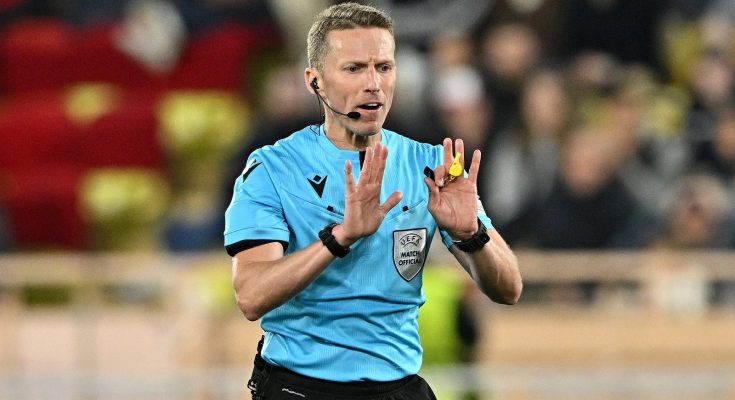What was supposed to be one of the most glorious nights in Borussia Dortmund’s recent Champions League history has now turned into a heated controversy that stretches beyond the boundaries of the pitch. The breathtaking 4:4 draw against Juventus in Turin had everything a neutral fan could wish for: spectacular goals, emotional comebacks, tactical drama, and an atmosphere worthy of a European football classic. Yet, instead of celebrating the resilience and attacking firepower displayed by both sides, the discussion after the final whistle has been dominated by outrage, criticism, and accusations directed at the refereeing team. Borussia Dortmund feels robbed, their fans furious, and the football world is split between admiration for the spectacle and anger at the way decisive decisions shaped the outcome.
From the very first whistle, the match was a pulsating rollercoaster. Juventus, roaring in front of their home crowd, struck early with a combination of relentless pressing and clinical finishing. Dortmund responded in the way only they can, driven by energy, courage, and their never-say-die mentality. The first half alone was a showcase of European attacking football at its finest, with counter-attacks, long-range screamers, and moments of brilliance from both sets of players. By halftime, the scoreline already hinted at chaos, but no one could predict how wild and controversial the second half would become.
The real storm began when Borussia Dortmund thought they had taken control of the game. After leveling the score at 3:3 with a spectacular effort, the black-and-yellow fans erupted in the away sector, singing songs of belief and destiny. Just minutes later, a quick attacking move seemed to give Dortmund the breakthrough they needed. A clever ball into the box found its way to Serhou Guirassy, who appeared to be bundled over by Juventus defender Danilo. From every angle, it looked like a clear penalty: Guirassy had positioned his body in front, the defender’s arms and legs made heavy contact, and the striker went down under pressure. Yet, to the disbelief of Dortmund’s players, the referee waved play on. VAR, which has been central to reducing such controversies, reviewed the situation but astonishingly chose not to intervene. The decision sparked outrage on the Dortmund bench and among supporters worldwide, who flooded social media with furious reactions. For many, this was the first of several moments where the officials seemed unwilling to give Dortmund the fair treatment they deserved.
As tensions grew, Juventus regained their composure and launched a counterattack. In the 76th minute, a low cross into the Dortmund penalty area struck the arm of Mats Hummels as he slid in to block. The ball deflected off his thigh before grazing his arm, yet the referee pointed directly to the spot. Dortmund’s players protested vehemently, arguing that Hummels’ arm was in a natural position and that the touch was incidental. The VAR check confirmed the penalty, and Juventus converted to make it 4:3. The outrage was deafening: just moments earlier, Guirassy had been denied a clear penalty at the other end, only for Juventus to be awarded one in a far more debatable scenario. Dortmund’s sense of injustice boiled over, and even neutrals were left scratching their heads at the inconsistency.
But the drama didn’t end there. Dortmund, fighting with their last ounce of strength, pushed forward with everything they had. In stoppage time, Marco Reus delivered a perfect free-kick into the box, where Niklas Süle rose highest to nod the ball home. The goal sparked jubilation — Dortmund had rescued a point in the most dramatic fashion. Yet even this moment was nearly spoiled. The assistant referee initially flagged for offside, causing confusion and anger, before VAR overturned the decision and allowed the goal to stand. The relief was immense, but the lingering bitterness from the earlier decisions remained. Instead of full-throated celebrations, Dortmund’s players and fans knew they were leaving Turin with a draw that felt unjust, robbed of a potential famous victory by officiating that will be debated for weeks.
The aftermath has been nothing short of explosive. Dortmund’s head coach could barely contain his frustration in the post-match interview, carefully choosing his words to avoid sanctions but making clear his discontent with what he labeled “a lack of consistency that cost us dearly.” Mats Hummels, one of the team’s veterans, spoke with visible disappointment, highlighting that players put their bodies on the line in such matches only for key decisions to undermine their effort. Social media erupted into a frenzy, with clips of the Guirassy incident going viral, accompanied by angry captions accusing UEFA and the refereeing team of double standards. Fans across the globe echoed Dortmund’s anger, while Juventus supporters largely celebrated their resilience and pointed to other incidents in the match that went against them, illustrating how polarized the discussion had become.
Refereeing in the Champions League has always been a hot topic, with fans of various clubs feeling hard done by at different times. Yet this particular evening has rekindled the wider debate on how VAR is used, whether referees apply rules consistently, and how much transparency there really is in decision-making. The Guirassy incident, in particular, has already been labeled one of the clearest penalties not given in recent memory. Many pundits suggested that if such a foul had occurred in the other box, a penalty would have been awarded without hesitation. The perception of bias, whether real or imagined, is damaging for the credibility of the competition. UEFA now finds itself under immense pressure to respond, as Dortmund’s management is expected to file an official complaint to highlight what they perceive as a miscarriage of justice.
For Borussia Dortmund, the night leaves mixed emotions. Scoring four goals away from home against Juventus should have been a triumph, a statement of intent that they are ready to challenge Europe’s elite once again. The attacking display, with Guirassy, Reus, and others combining beautifully, deserves recognition. But instead of being celebrated, the performance has been overshadowed by refereeing debates. The players, while proud of their resilience, boarded the flight back to Germany with a bitter taste, knowing they had been denied the chance to turn an extraordinary performance into a historic victory.
The ripple effect of this controversy goes beyond the single match. In a group stage where every point matters, Dortmund might find themselves disadvantaged in the battle for qualification. A win in Turin would have placed them in a commanding position; a draw, though still valuable, leaves the door open for complications. The psychological impact is also considerable: when players feel decisions are stacked against them, frustration and doubt can creep in. Fans, too, may feel that no matter how well the team performs, external forces can alter outcomes.
Yet amidst the chaos and anger, there is also a sense of unity. Dortmund’s supporters, both in Germany and around the world, have rallied behind the team with renewed passion. Chants of injustice echo through fan forums, but so too does admiration for the players’ fighting spirit. If anything, this scandal may strengthen the bond between the team and its fans, who now feel even more determined to back their club against all odds. Football history has shown time and again that clubs who emerge from such controversies often find added motivation, using perceived injustice as fuel to achieve greatness.
Juventus, meanwhile, face their own complicated reality. While they avoided defeat and showcased their attacking firepower, their performance is being overshadowed by accusations of benefiting from questionable calls. The Italian press, always sharp in its analysis, has been divided, with some defending the referees and others acknowledging that the penalty incidents cast a shadow over what could have been a celebrated evening for the Old Lady. For neutral fans, the narrative of a classic Champions League encounter has been transformed into yet another example of refereeing controversy defining outcomes.
The debate is unlikely to fade anytime soon. Pundits across Europe continue to dissect the incidents frame by frame, UEFA faces mounting pressure to explain VAR’s silence in the Guirassy incident, and Borussia Dortmund prepares for the next chapter of their Champions League journey carrying both pride in their performance and fury at the officiating. What should have been remembered as a night of breathtaking football will instead be recorded in history as one of those evenings when refereeing overshadowed the sport itself. And in football, where emotions run high and legacies are built on moments, such scars linger for years.
For Borussia Dortmund, the mission now is clear: turn anger into energy, frustration into determination, and controversy into motivation. The Champions League is far from over, and while this night will be remembered for its scandals, the competition still offers opportunities for redemption. Whether they can rise above the bitterness and channel their fury into glory will define not just this European campaign, but perhaps the club’s narrative for seasons to come. One thing, however, is already certain: the night in Turin will not be remembered for the eight goals scored, but for the storm that followed, a scandal that ensured the referee’s whistle echoed louder than the players’ brilliance.



